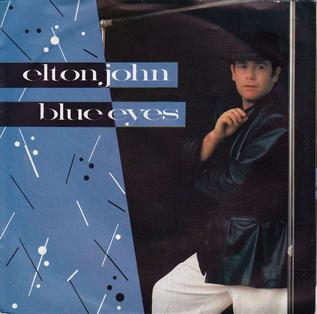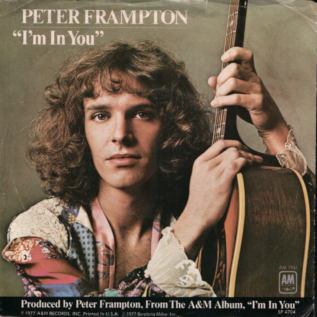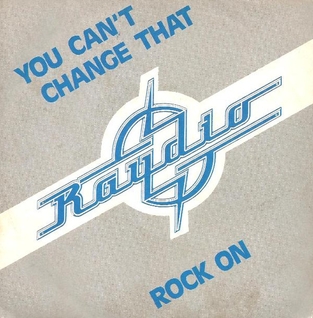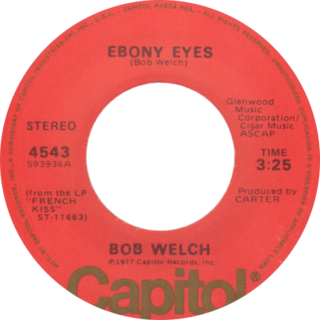
Ray Erskine Parker Jr. is an American musician, singer, songwriter, and record producer. As a solo performer, he wrote and performed the theme song for the 1984 film Ghostbusters. Previously, Parker achieved a US top-5 hit in 1982 with "The Other Woman". He also performed with his band, Raydio, and with Barry White in the Love Unlimited Orchestra.
Raydio is an American funk and R&B vocal group formed in 1977 by Ray Parker Jr., with Vincent Bonham, Jerry Knight, and Arnell Carmichael. In 1978 Charles Julian Fearing and Larry “Fatback” Tolbert joined the band, along with Darren Carmichael.

"December, 1963 " is a song originally performed by the Four Seasons, written by original Four Seasons keyboard player Bob Gaudio and his future wife Judy Parker, produced by Gaudio, and included on the group's album Who Loves You (1975).

"How Deep Is Your Love" is a pop ballad written and recorded by the Bee Gees in 1977 and released as a single in September of that year. It was ultimately used as part of the soundtrack to the film Saturday Night Fever. It was a number-three hit in the United Kingdom and Australia. In the United States, it topped the Billboard Hot 100 on 25 December 1977 and stayed in the Top 10 for 17 weeks. It spent six weeks atop the US adult contemporary chart. It is listed at No. 27 on Billboard's All Time Top 100. Alongside "Stayin' Alive" and "Night Fever", it is one of the group's three tracks on the list. The song was covered by Take That for their 1996 Greatest Hits album, reaching No. 1 on the UK Singles Chart for three weeks.

"You're in My Heart (The Final Acclaim)" is a song written and recorded by Rod Stewart for his 1977 album Foot Loose & Fancy Free. The song became a hit, reaching the top ten of many countries, including the United States (number 4), Canada (number 2), and Australia, peaking at number 1 for one week.
"If I Were a Carpenter" is a folk song written by Tim Hardin in the 1960s, and re-recorded with commercial success by various artists including Bobby Darin, The Four Tops and Johnny Cash. Hardin's own recording of the piece appeared on his 1967 album Tim Hardin 2. It was one of two songs from that release performed by Hardin at Woodstock in 1969. The song, believed by some to be about male romantic insecurity, is rumored to have been inspired by his love for actress Susan Morss, as well as the construction of Hardin's recording studio.

"Woman in Love" is a song performed by Barbra Streisand and taken from her 1980 album Guilty. The song was written by Barry and Robin Gibb of the Bee Gees, who received the 1980 Ivor Novello award for Best Song Musically and Lyrically. It is her fourth of four Platinum records, and is considered her greatest international hit.

"Every Time I Think of You" is a song written by Jack Conrad and Ray Kennedy and released in December 1978 as the lead single from The Babys' third studio album Head First; John Waite provided lead vocals, featuring female vocals by Myrna Matthews. The track was a worldwide hit, and became their last top 20 in the United States.

"Shadow Dancing" is a disco song performed by English singer-songwriter Andy Gibb. The song was released in April 1978 as the lead single from his second studio album of the same name. The song reached number one for seven consecutive weeks on the Billboard Hot 100 in 1978. Albhy Galuten arranged the song with Barry Gibb. While Andy Gibb would have three more Top 10 hits in the U.S., this would be his final chart-topping hit in the United States. The song became a platinum record.

"Candy Girl" is the debut single by New Edition from their debut album Candy Girl. It was released as a single in late February 1983 and the song hit number one on the UK Singles Chart, becoming the 31st-best-selling single of the year. It also peaked at number 1 on the Hot Black Singles chart, passing Michael Jackson’s song "Beat It" on May 14, 1983.

"Magnet and Steel" is a hit single written and performed by Walter Egan, released in March 1978. It was the first and biggest hit on Egan's second solo LP, Not Shy. It reached number eight on the U.S. Billboard Hot 100 and number nine in Canada. It spent 22 weeks on the American charts.

"Show Me the Way" is a song by the English rock musician Peter Frampton. Originally released in June 1975 as the lead single from his fourth studio album Frampton, it gained popularity after being recorded live and released in February 1976 as the lead single from his live album Frampton Comes Alive! In the US, the song reached number 6 on the Billboard Hot 100 and number 10 on the UK Singles Chart, becoming his biggest US hit until "I'm in You" in 1977.

"Blue Eyes" is a song performed by English musician Elton John with music and lyrics written by John and Gary Osborne. It was released in 1982, as the UK lead single from John's 16th studio album, Jump Up! (1982). It was released as the album's second single in the US. It hit No. 8 in the UK; in the US, it spent three weeks at No. 10 on the Cash Box chart, went to No. 12 on the Billboard Hot 100, and spent two weeks at No. 1 on the Billboard AC chart. John performed this song often in his concerts until 2012.

"I Just Want to Be Your Everything" is a song recorded by Andy Gibb, initially released in April 1977 as the first single from his debut album Flowing Rivers. It reached number 1 on the Billboard Hot 100 for three weeks, starting on the week ending 30 July 1977, and again for the week ending 17 September 1977. It was Gibb's first single released in the United Kingdom and United States. His previous single, "Words and Music" was only released in Australia. It is ranked number 26 on Billboard's 55th anniversary All Time Top 100.

"I'm in You" is the hit song released by Peter Frampton as a single from his album I'm in You, released in 1977. The song is Frampton's biggest hit on charts around the world. It rose to No. 2 on the US Billboard Hot 100 and No. 1 on the Cash Box Top 100 and in Canada, becoming his most successful single.

"You Can't Change That" is a song by Raydio from their second studio album Rock On. Released as a single in 1979, it reached #9 on the US Billboard Hot 100 chart and #3 on the soul chart.

"A Woman Needs Love (Just Like You Do)" is a 1981 song recorded by American R&B vocalist and songwriter Ray Parker Jr., along with his group, Raydio. It led their 1981 album, A Woman Needs Love, the last Parker recorded with Raydio.

Raydio is the debut album by the band Raydio in 1978 on Arista Records. The album peaked at No. 8 on the Billboard Top Soul LPs chart and No. 27 on the Billboard 200 chart. Raydio was certified Gold in the US by the RIAA.

Rock On is the second album by Raydio, released in 1979 on Arista Records. The album reached No. 4 on the US Billboard Top Soul Albums chart and No. 45 on the US Billboard 200 chart. Rock On was also certified Gold in the US by the RIAA.

"Ebony Eyes" is a song written and performed by Bob Welch. The song was the second single release and second hit song from his album French Kiss. Backing vocals are provided by Juice Newton.


















